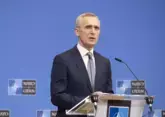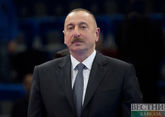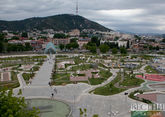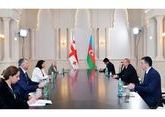Three South Caucasian capitals were surprised by statement made by Georgian President Salome Zurabishvili during her visit to Baku, in which she essentially condemned occupation of Nagorno-Karabakh and adjacent territories, expressing regret that territorial integrity of Azerbaijan hasn't been restored yet. This sensational statement caused speculations about possible change of Tbilisi's neutral policy.
However, Georgian politicians, with rare exceptions, are still trying to ignore Zurabishvili’s statement. However, words said by the head of state have already become a historical fact, which affects both Georgian-Azerbaijani and Georgian-Armenian relations.
Former assistant of the Prime Minister of Georgia, Giorgi Khukhashvili, told Vestnik Kavkaza that other Georgian politicians' reluctance to comment on president’s statement doesn't surprise him, but "there's nothing better than the truth that Salome Zurabishvili voiced in Baku. "She stated facts: territories of Azerbaijan are occupied. Of course, Yerevan doesn't like this statement very much. But nothing can be done, the truth is now out there. And it's a case when Zurabishvili told absolute truth," Giorgi Khukhashvili said. Answering whether president’s statement could affect “real politics”, considering the fact that Georgia has parliamentary form of government, he noted that her statement remains the most important event of her trip to Baku, regardless of whether or not the head of state has authority to affect foreign policy, because things she says represent Georgia's opinion.
One of the leaders of the opposition parliamentary party European Georgia, former deputy Foreign Minister Sergo Kapanadze, confirmed to Vestnik Kavkaza that long before President Zurabishvili’s statement "Georgia has repeatedly supported Azerbaijani resolutions at the UN General Assembly, condemning occupation of Azerbaijani territories. However, that support came from specific international context,” experienced diplomat stressed, making it clear that Georgian President's latest statement opens a new page of Caucasian diplomacy.
Leader of Georgian refugees, chairman of the Supreme Council, Giorgi Gvazava, said that Georgia "should reconsider its approach to Armenian-Azerbaijani conflict. Surprisingly, before President Zurabishvili’s statement, we turned a blind eye to the fact that Armenia constantly voted against Georgian resolutions on refugee issues at the UN General Assembly,” Gvazava noted, adding that Georgian President's statement during her visit to Baku “was clearly not an accident."
Considering the fact that Salome Zurabishvili was a staff member of the French Foreign Ministry in the past and is considered a very experienced diplomat, her statement can also be interpreted in a broader international aspect, as a symptom of European diplomacy’s fatigue from maintaining an unfair status quo around the occupation and unresolved Armenian-Azerbaijani conflict. Moreover, President of Georgia spoke about this conflict right after successful visits to Brussels, Paris and Berlin.










